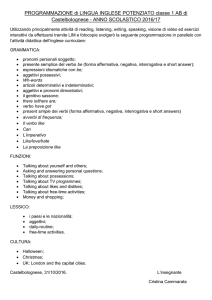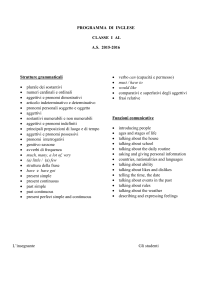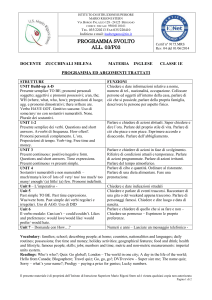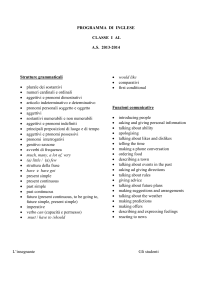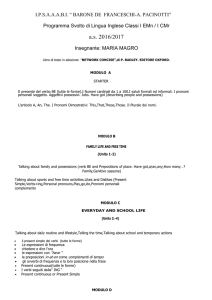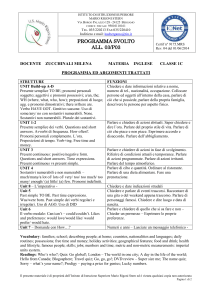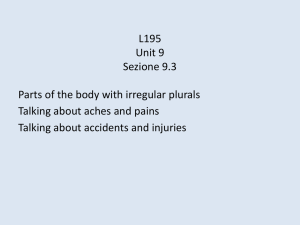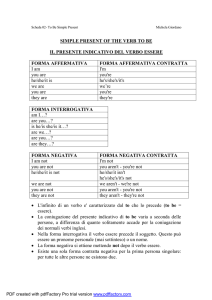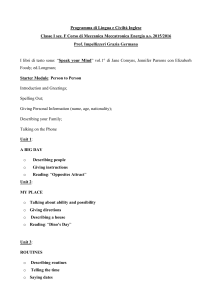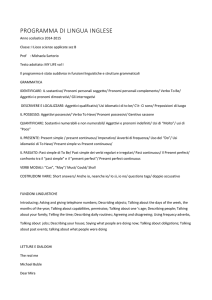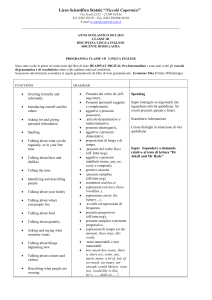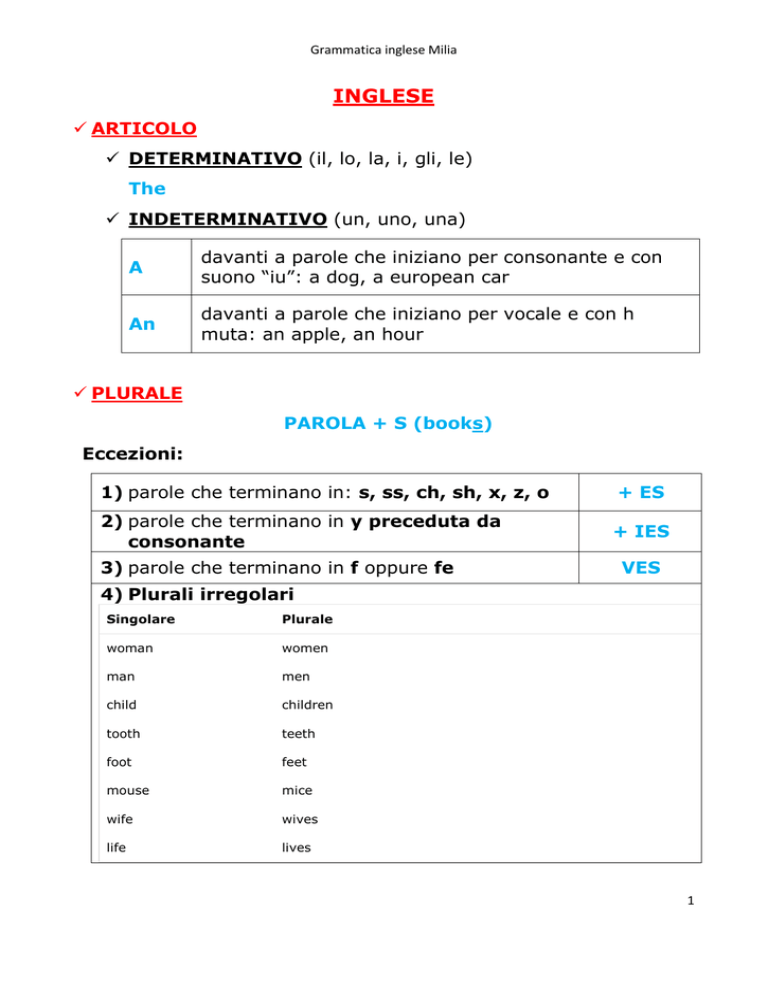
Grammatica inglese Milia
INGLESE
ARTICOLO
DETERMINATIVO (il, lo, la, i, gli, le)
The
INDETERMINATIVO (un, uno, una)
A
davanti a parole che iniziano per consonante e con
suono “iu”: a dog, a european car
An
davanti a parole che iniziano per vocale e con h
muta: an apple, an hour
PLURALE
PAROLA + S (books)
Eccezioni:
1) parole che terminano in: s, ss, ch, sh, x, z, o
+ ES
2) parole che terminano in y preceduta da
consonante
+ IES
3) parole che terminano in f oppure fe
VES
4) Plurali irregolari
Singolare
Plurale
woman
women
man
men
child
children
tooth
teeth
foot
feet
mouse
mice
wife
wives
life
lives
1
Grammatica inglese Milia
AGGETTIVI E PRONOMI DIMOSTRATIVI
VICINO A CHI PARLA
LONTANO DA CHI PARLA
SINGOLARE
THIS = questo/a
THAT = quello/a
PLURALE
THESE = questi/e
THOSE = quelli/e
La differenza tra aggettivo e pronome:
- Aggettivo: accompagna il nome (Es. Questo libro è mio)
- Pronome: sostituisce il nome (Es. Questo è il libro di Marco)
AGGETTIVO QUALIFICATIVO
Nella lingua inglese l'aggettivo qualificativo è, a differenza di
quella italiana, unico e invariabile, non cambia cioè né in base al
genere (maschile o femminile), né in base al numero (singolare o
plurale).
Es.
Bel cane = NICE DOG
>
Bei cani = NICE DOGS
L’ aggettivo precede sempre il nome cui si riferisce.
2
Grammatica inglese Milia
ARTICOLI PARTITIVI (dei, degli, delle…)
Gli articoli partitivi indicano una parte imprecisata di un
tutto.
Equivalgono, per significato, alle espressioni “un po’ di”, “una
certa quantità di”, “un certo numero di”.
Al singolare: gli articoli partitivi presentano una certa affinità
con i pronomi indefiniti (uno, qualche, alcuni).
Al plurale: gli articoli partitivi equivalgono a alcuni, alcune o
qualche,
e
sostituiscono
il
plurale
dell’articolo
indeterminativo un, che nella grammatica della lingua italiana
non esiste.
Ricapitolando, ecco quali sono gli articoli partitivi nella grammatica della
lingua italiana e qual è la loro origine grammaticale:
ARTICOLI PARTITIVI
MASCHILE
FEMMINILE
SINGOLARE
PLURALE
del (di + il)
dei (di + i)
dello (di + lo)
degli (di + gli)
dell’ (di + l’)
degli (di + gli)
della (di + la)
delle (di + le)
dell’ (di + l’)
delle (di + le)
Some: Frasi Affermative (o di cortesia)
Es. I have got some books.
Would you like some coffee?
Any: Frasi Interrogative e Negative
Es. I haven’t got any books.
Have you got any books?
3
Grammatica inglese Milia
GENITIVO SASSONE
Possessore + ‘S + Cosa Posseduta
Quando i possessori sono più di uno, ’s si mette solo dopo l’ultimo
possessore.
Es. Sam, Emma and Paul’s house = la casa di Sam, Emma e Paul
THERE IS / THERE ARE
THERE IS = c’è
THERE ARE = ci sono
4
Grammatica inglese Milia
PRONOMI PERSONALI SOGGETTO
5
Grammatica inglese Milia
PRONOMI PERSONALI COMPLEMENTO
Es. Noi ci amiamo
Noi amiamo (chi?) noi
SOGGETTO
(We)
COMPLEMENTO
(Us)
6
Grammatica inglese Milia
AGGETTIVI E PRONOMI POSSESSIVI
• Non vogliono l’articolo.
• Sono invariabili per genere e numero.
• Alla terza persona concordano con il possessore (Suo di chi? Di
lui, di lei, di esso).
Es. Maria e suo padre sono a casa.
Maria e suo (di chi? Di lei)
her
Maria and her father are at home
7
Grammatica inglese Milia
INFINITO
PRESENT SIMPLE VERBO ESSERE (TO BE)
FORMA ESTESA
AFFERMATIVA
INTERROGATIVA
NEGATIVA
INTERROGATIVONEGATIVA
I am
Am I?
I am not
Am I not?
You are
Are you?
You are not
Aren’t you?
He/She/It is
Is he/she/it?
He/She/It is not
Isn’t he/she/it?
We are
Are we?
We are not
Aren’t we?
You are
Are you?
You are not
Aren’t you?
They are
Are they?
They are not
Aren’t they?
FORMA CONTRATTA:
AFFERMATIVA
I’m
You’re
He’s
…
INTERROGATIVA
--------
NEGATIVA
I ‘m not
You aren’t
He isn’t
…
INTERROGATIVONEGATIVA
--------
8
Grammatica inglese Milia
SHORT ANSWERS
YES, SOGG + AUS
NO, SOGG + AUS + NOT
PRESENT SIMPLE VERBO AVERE (TO HAVE)
FORMA ESTESA
AFFERMATIVA
INTERROGATIVA
NEGATIVA
INTERROGATIVONEGATIVA
I have got
have I got?
I have not got
Haven’t I got?
You have got
have you got?
You have not got
Haven’t you got?
He/She/It has got
Has he/she/it got?
He/She/It has not
got
Hasn’t he/she/it
got?
We have got
have we got?
We have not got
Haven’t we got?
You have got
have you got?
You have not got
Haven’t you got?
They have got
have they got?
They have not got Haven’t they got?
FORMA CONTRATTA:
AFFERMATIVA
I’ve got
You’ve got
He’s got
…
INTERROGATIVA
--------
NEGATIVA
I haven’t got
You haven’t got
He hasn’t got
…
INTERROGATIVONEGATIVA
--------
9
Grammatica inglese Milia
PREPOSIZIONI DI TEMPO
IN BREVE:
• AT: si usa con le ore e con la parola «night» (At 5 o’clock)
• IN: si usa con mesi, stagioni, anni e parti
del giorno (In
1983; in the morning)
• ON: si usa con i giorni della settimana e le date (On Sunday)
APPROFONDIAMO:
10
Grammatica inglese Milia
PREPOSIZIONI DI LUOGO
Attenzione:
•
•
•
•
IN (in) : stato in luogo
AT (a): stato in luogo
TO (a): moto a luogo
FROM (da): moto da luogo
11
Grammatica inglese Milia
INDICAZIONI STRADALI
STRUTTURA DELLA FRASE
12
Grammatica inglese Milia
I VERBI CHE CONOSCEREMO
PRESENTE
PRESENT SIMPLE: azione abituale (I play, I don’t play, Do I play?)
PRESENT CONTINUOUS: azione in corso di svolgimento (I am playing)
PASSATO
PAST SIMPLE (imperfetto, passato remoto, passato prossimo): azione passata,
conclusa e di cui conosciamo il riferimento temporale (I played, I didn’t play, Did I
play?)
PRESENT PERFECT (passato prossimo): azione passata, non conclusa o che ha
effetti sul presente e di cui non conosciamo il riferimento temporale (HAVE+PART.
PASS: I have played)
PRESENT PERFECT CONTINUOUS: azione iniziata nel passato e che continua nel
presente o della quale si vuole evidenziare la durata (HAS/HAVE BEEN + FORMA ING: I have been playing)
PAST PERFECT (trapassato prossimo): (HAD+PART. PASS: I had played)
PAST CONTINUOUS: azione in corso di svolgimento nel passato (I was playing)
FUTURO
PRESENT SIMPLE: azione certa che non dipende da me
PRESENT CONTINUOUS: azione programmata
TO BE GOING TO: futuro intenzionale
WILL: azioni improvvise, condizioni meteorologiche, azioni molto future
13
Grammatica inglese Milia
PRESENT SIMPLE (azioni abituali)
USE:
1) Routines, habits
Ex. I wake up at 7 every morning
2) Occupation, job
Ex. What does your father do?
What do you do?
3) General truths, facts
Ex. The sun rises in the east
Vegetarians do not eat meat
TO TALK
I talk
Do I talk?
I don’t talk
INTERROGATIVONEGATIVA
Don’t I talk?
You talk
We talk
Do you talk?
Does he/she/it
talk?
Do we talk?
You don’t talk
He/she/it doesn’t
talk
We don’t talk
Don’t you talk?
Doesn’t he/she/it
talk?
Don’t we talk?
You talk
Do you talk?
You don’t talk
Don’t you talk?
They talk
Do they talk?
They don’t talk
Don’t they talk?
AFFERMATIVA
INTERROGATIVA
He/She/It talks
NEGATIVA
Eccezioni relative all’aggiunta della s alla terza persona singolare (cfr.
regole formazione del plurale dei sostantivi):
1) Verbs ending in –s, -ss, -ch, -sh, -x, -z
To Wash
washes
To Watch
watches
To Buzz
buzzes
To Fix
fixes
To Guess
+ES
guesses
2) To do /to go
+ES
He does/goes
3) Verbs ending in –y, if before the –y there is a consonant + IES
To study
He studies
14
Grammatica inglese Milia
PRESENT CONTINUOUS (azione in corso di svolgimento)
VERBO ESSERE + VERBO IN ING
TO TALK
I am talking
Am I talking?
I am not talking
INTERROGATIVONEGATIVA
Am I not talking?
You are talking
He/She/It is
talking
We are talking
Are you talk?
Is he/she/it
talking?
Are we talking?
You aren’t talking
He/she/it isn’t
talking
We aren’t talking
Aren’t you talking?
Isn’t he/she/it
talking?
Aren’t we talking?
You are talking
Are you talking?
Aren’t you talking?
They are talking
Are they talking?
You aren’t talking
They aren’t
talking
AFFERMATIVA
INTERROGATIVA
NEGATIVA
Aren’t they talking?
VARIAZIONI ORTOGRAFICHE PER L’AGGIUNTA DI -ING
15
Grammatica inglese Milia
AVVERBI DI FREQUENZA
Si usano con il Present simple
How often di solito precede nelle domande gli avverbi di frequenza
SOGG + AVVERBIO FREQUENZA + VERBO
SOGG + VERBO ESSERE + AVVERBIO FREQUENZA
16
Grammatica inglese Milia
PRONOMI E AVVERBI INTERROGATIVI
17
Grammatica inglese Milia
PAST SIMPLE VERBO ESSERE (TO BE)
Traduce: Imperfetto (ero), passato prossimo (sono stato), passato
remoto (fui)
Si usa per esprimere un’azione passata conclusa.
AFFERMATIVA
INTERROGATIVA
NEGATIVA
INTERROGATIVONEGATIVA
I was
Was I?
I wasn’t
Wasn’t I?
You were
were you?
You weren’t
Weren’t you?
He/She/It was
Was he/she/it?
He/She/It wasn’t
Wasn’t he/she/it?
We were
were we?
We weren’t
Weren’t we?
You were
were you?
You weren’t
Weren’t you?
They were
were they?
They weren’t
Weren’t they?
Short answers:
Yes, I was
No, I wasn’t
THERE WAS/THERE WERE
There was = c’era
There were = c’erano
PAST SIMPLE VERBI REGOLARI (+ ED)
Traduce: Imperfetto (studiavo), passato prossimo (ho studiato), passato
remoto (studiai)
Si usa per esprimere un’azione passata conclusa.
AFFERMATIVA
I studied
You studied
He/She/It studied
We studied
You studied
They studied
INTERROGATIVA
Did I study?
Did You study?
Did He/She/It
study?
Did We study?
Did You study?
Did They study?
NEGATIVA
I didn’t study
You didn’t study
He/She/It didn’t
study
We didn’t study
You didn’t study
They didn’t study
INTERROGATIVONEGATIVA
Didn’t I study?
Didn’t You study?
Didn’t He/She/It
study?
Didn’t We study?
Didn’t You study?
Didn’t They study?
18
Grammatica inglese Milia
Per aggiungere –ed, seguiamo la stessa regola dell’aggiunta della -s
alla
terza
persona
singolare
del
Present
Simple
(study/studies/studied).
La spelling modification c’è per il Present simple e il Past simple ma non
per l’agggiunta di –ing (study/studying).
SPELLING MODIFICATION:
- CVC (consonante, vocale, consonante)
travel --- travelled
- Verbi di preferenza:
love --- loved
hate --- hated
like --- liked
dislike --- disliked
PAST SIMPLE VERBI IRREGOLARI
Traduce: Imperfetto (mangiavo), passato prossimo (ho mangiato),
passato remoto (mangiai)
Si usa per esprimere un’azione passata e conclusa.
BASE FORM
PAST SIMPLE
PAST
PARTICIPLE
EAT
ate
Eaten
THINK
thought
thought
DRIVE
drove
driven
FLY
flew
flown
READ
read
read
CUT
cut
Cut
Es. Yesterday I read a book
19
Grammatica inglese Milia
COME SI FORMA IL PAST SIMPLE DEI VERBI IRREGOLARI
AFFERMATIVA
INTERROGATIVA
NEGATIVA
INTERROGATIVONEGATIVA
I bought
Did I buy?
I didn’t buy
Didn’t I buy?
You bought
Did You buy?
You didn’t buy
Didn’t You buy?
He/She/It bought
Did He/She/It
buy?
He/She/It didn’t
buy
Didn’t He/She/It
buy?
We bought
Did We buy?
We didn’t buy
Didn’t We buy?
You bought
Did You buy?
You didn’t buy
Didn’t You buy?
They bought
Did They buy?
They didn’t buy
Didn’t They buy?
La forma irregolare riguarda solo la forma affermativa.
LE FORME E L’USO DEL PAST SIMPLE
LE VARIE FORME:
FRASE AFFERMATIVA: Soggetto + past simple
FRASE NEGATIVA: Soggetto + didn’t + base form
FRASE INTERROGATIVA: Did + soggetto + base form
FRASE INTERROGATIVO-NEGATIVA: Didn’t + soggetto + base form
L’USO DEL PAST SIMPLE:
AZIONI PASSATE E CONCLUSE
Key words: yesterday, last year, an hour ago, in 1996
ES. Yesterday I went shopping
She ate an apple an hour ago
We worked hard last year
He was born in 1996
20
Grammatica inglese Milia
PAST CONTINUOUS
(azione
in corso
di
svolgimento
nel
passato)
VERBO ESSERE AL PASSATO + VERBO IN ING
TO TALK
AFFERMATIVA
INTERROGATIVA
I was talking
Was I talking?
You were talking
were you talk?
He/She/It was
talking
Was he/she/it
talking?
We were talking
were we talking?
You were talking
were you talking?
They were talking
were they talking?
NEGATIVA
I wasn’t talking
You weren’t
talking
He/she/it wasn’t
talking
We weren’t
talking
You weren’t
talking
They weren’t
talking
INTERROGATIVONEGATIVA
Wasn’t I talking?
weren’t you
talking?
Wasn’t he/she/it
talking?
weren’t we talking?
weren’t you
talking?
weren’t they
talking?
Short answers:
Yes, I was
No, I wasn’t
Es. I was reading --- Io stavo leggendo
21

